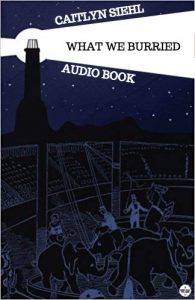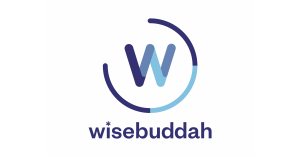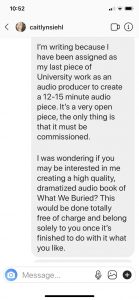Individual Audio Project Title: What We Buried Audio Book Teaser- A short selection of poems from Caitlyn Siehl’s debut poetry collection that have been transformed into an experimental audio book that takes the listener on an aural journey
https://soundcloud.com/pulamakaufman/what-we-buried-audiobook-teaser

Work Experience: 2 week work experience at Wisebuddah Productions

Part 1: Research
From the start of my work experience search, it was important to me to seek out companies that made the type of content I was passionate about. I wanted to gain experience at a radio station that was known for making documentaries or features as that is the medium I aspire to produce as a career. I reached out to the obvious candidates, BBC 4, NPR, LBC, etc, but the more research I did, the more it became clear that a majority of features and documentaries are outsourced by radio stations to independent production companies. During this time I found Wisebuddah and noticed that they had created a lot of the radio features I admired, including “Pocket Money Drugs” for BBC 1XTRA Stories and, “The President and the Press” for BBC World Service. I submit an application for work experience highlighting my love of the work they did, and then, as fate would have it, an alumni, who now is the Head of Voices at Wisebuddah, came to give a talk to the course just days later. She put in a good word with my application, I got an interview, and within a week of that talk I had work experience set up for a couple of months out. However, if I had not first identified what was important to me and actively seeked that out from this experience, I would not have found a company I felt genuinely excited to be a part of, if only for a short time.
I learned from that experience that self reflection before beginning research is very valuable and I carried that into my individual audio project. Before researching current story topics or possible production angles, I first asked myself what was important to me. I knew this would be a project I would be spending countless hours on so I wanted to ensure I would remain passionate about it. My first idea was to create a documentary that looked at the story behind the people who worked at concentration camps turned memorials. The Holocaust is always something I had wanted to do a piece on, and I knew this particular human interest angle was new and unique. I pursued that initially but after my first correspondence with the press team at Auschwitz I quickly realized that the time it would take to get permission and sort through the press passes, etc. would no be in my best interest. Instead I tabled that idea for another time and re-examined my options and my interests. I decided then that I wanted to push myself out of my comfort zone and explore an audio medium I hadn’t before. So, I chose to do an audiobook.
I thought about the books that I would personally love to hear as an audiobook, and then I thought broader to what would be unique and fresh in that market. I did some research on Audible and Apple Books and realized that the poetry sections were quite limited. It was either prose or older, more famous, poets books that had been turned into audiobooks and there was little to no titles aimed at a younger audience. After a scan through my personal poetry collection, I rediscovered a favorite of mine called, “What We Buried” by the author, Caitlyn Siehl. It’s aimed at young women and explores themes of love, self-acceptance, recovery, and forgiveness. All of these themes came up time and time again in the best selling audiobooks of the previous year so I thought this was a great choice to explore (Audible, 2017).
I contacted the author through her instagram as she is most active on that platform and I wanted to get the ball rolling. Below was my pitch to her:

I went on to explain to her that I wanted to make this more of an exciting feel than a traditional audiobook using some experimental production techniques. I knew this type of audio was gaining traction because of the popularity of radio programmes like BBC 3’s, “Between the Ears” and podcasts like, “Radiolab,” (YouGov) which I sited to her when explaining my vision.
She was more than supportive for me to take some creative license when transforming her words, so off I set on making my vision into a reality.
Part 2: Learning Process
I went in to my work experience at Wisebuddah with a couple of goals in mind. I wanted to learn how a production house functioned and see all the working pieces that go into creating a successful company, I wanted to gain more studio skills, and I wanted to learn how the content team develops an idea from the ground up. On my first day I was welcomed with open arms and immediately felt comfortable and appreciated by the full-time staff. My mentor Kat and I worked together and went over what I wanted to get out of the experience as well as what she expected from me. Again, my initial self-reflection was very valuable in this instance because it allowed me to express what I wanted, and in turn, allowed me to have a very fruitful experience there.
During my work experience, I spent time across each of the departments; from the runners, to the studio department, to voices, to imaging and branding, and finally, operations. At each point, I learned new practical and interpersonal skills. Those two weeks were very fruitful for me. Technically, I learned skills in Pro Tools, learned how to navigate the back end of NoSheetMusic and IMGR, and was taught quick and efficient ways to edit imaging and small packages. Operationally, I was taught how to use their studio scheduling system, how to put together clear and engaging presentations for potential clients, and how they log and upload each project, once it has been completed, into their company portfolio. Additionally, I gained skills in studio management and production, and script writing.
I was very fortunate, as I wasn’t asked to sit on the sidelines and observe. Instead, they taught me practical skills and gave me the chance to put them into use. By the end of my time there, I was setting up studios and logging projects without any supervision or direction and creating scripts for people like John Boyega and Clara Amfo.
Aside from all of the wonderful practical skills I gained, the most valuable skill I learned from my work experience at Wisebuddah was how important respect in a workplace is. Everyone from the runners to the CEO work in the same 5 floor building and they interact daily. Everyone’s role is treated with respect and is valued across each department. I had not experienced a workplace that demonstrated this so well before, and it showed in their productivity, and it was felt the moment you walked through the door. Even I knew that what I did for them in my short time truly mattered.
This lesson really resonated with me and I have implemented it into my working relationships since. An example of this was the time I spent communicating and working with the author, Caitlyn Siehl, while producing my individual audio project. It was very important to me that she knew I valued her work and didn’t want to do anything with it that would make her uncomfortable. In turn, she gave me the same respect and trusted me to use my skills to create something unique and engaging. Throughout the whole process we maintained open lines of communication and that was very beneficial for both parties. She was able to listen to drafts and give me useful feedback and I was able to ask for clarifications on any theme or poem I was struggling with.
At one point, after getting insightful feedback, I decided that I wanted to include her voice in the final piece. I reached out to her and she was more than happy to answer any questions I had about the poetry collection and her writing process. It struck me while listening to her answers just how connected artists and writers are to their work. The way she talked about each poem was poetry in itself and it instilled a great pride in me to be trusted with something so personal to her.
Here is a clip of her talking about her poem “A Prayer”
I cultivated a wonderful working relationship with Caitlyn based on mutual respect and my admiration for her work. At the end of the experience I was left with not only an audiobook sample I felt proud of, but a greater appreciation for creative minds like Caitlyns’.
Part 3: Going Forward
When I began my course at university I envisioned myself producing speech programmes like those on NPR and the BBC World Service. These were programmes I thoroughly enjoyed listening to and thus thought the natural progression would be to aim to work for these companies. While I still enjoy listening to these programmes, I have found new forms of audio and radio that resonate with me more deeply. The draw of radio for me, has always been the human connection in creates. Through completing my course, work experience, and most recently, the individual audio project, my passion to create things that bring people together has only been more solidified.
Because of this, I have identified that feature and documentary making is what I strive to do in my career. I believe I have the drive and creativity to come up with content for a variety of audiences and the skills to produce compelling audio pieces. My work experience showed me that there is not only way to get into this field. As I mentioned at the start of this blog, I used to think the only way to create documentaries was to work for a radio station. I know now that a large portion of features and documentaries are made my independent production houses, like Wisebuddah, and freelance producers. Each person on the Wisebuddah content production team brought a unique talent and skill set to them company; a personal brand of sorts. I learned from working with them, and from working with a creative like Caitlyn, that bringing a unique passion to the table makes you stand out and makes you desirable to a company.
Off the back of those experiences I have come up with some practical steps I can follow to put myself on-track to successfully apply for jobs in this field post-graduation (July, 2019):
- Purchase a camera and continue to create digital content that I am passionate about and that establishes my personal brand.
- Create at least 3, 5-10 minute documentaries before June that demonstrate my unique content ideas and editing skills.
- Apply for work experience, internships, and part time roles consistently. Complete at least 2 further work experience placements or an internship before June.
- Finalize my online portfolio to include examples of both audio and digital (photos and videos) projects I have produced. Make sure the entire portfolio is at a standard I am proud of so I can include it in job applications.
- Consistently stay in touch with industry contacts I have and offer my skills to any projects they are working on.